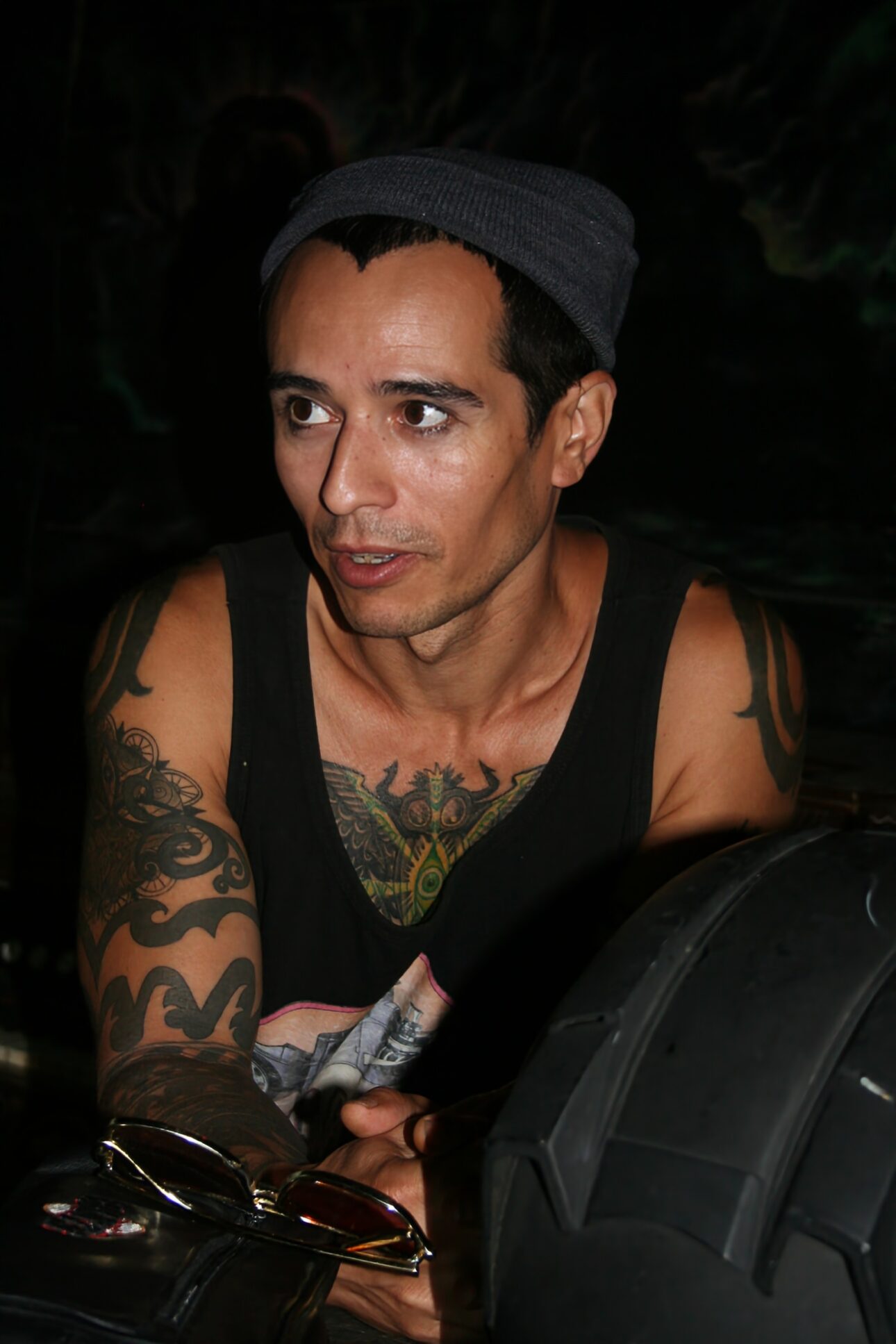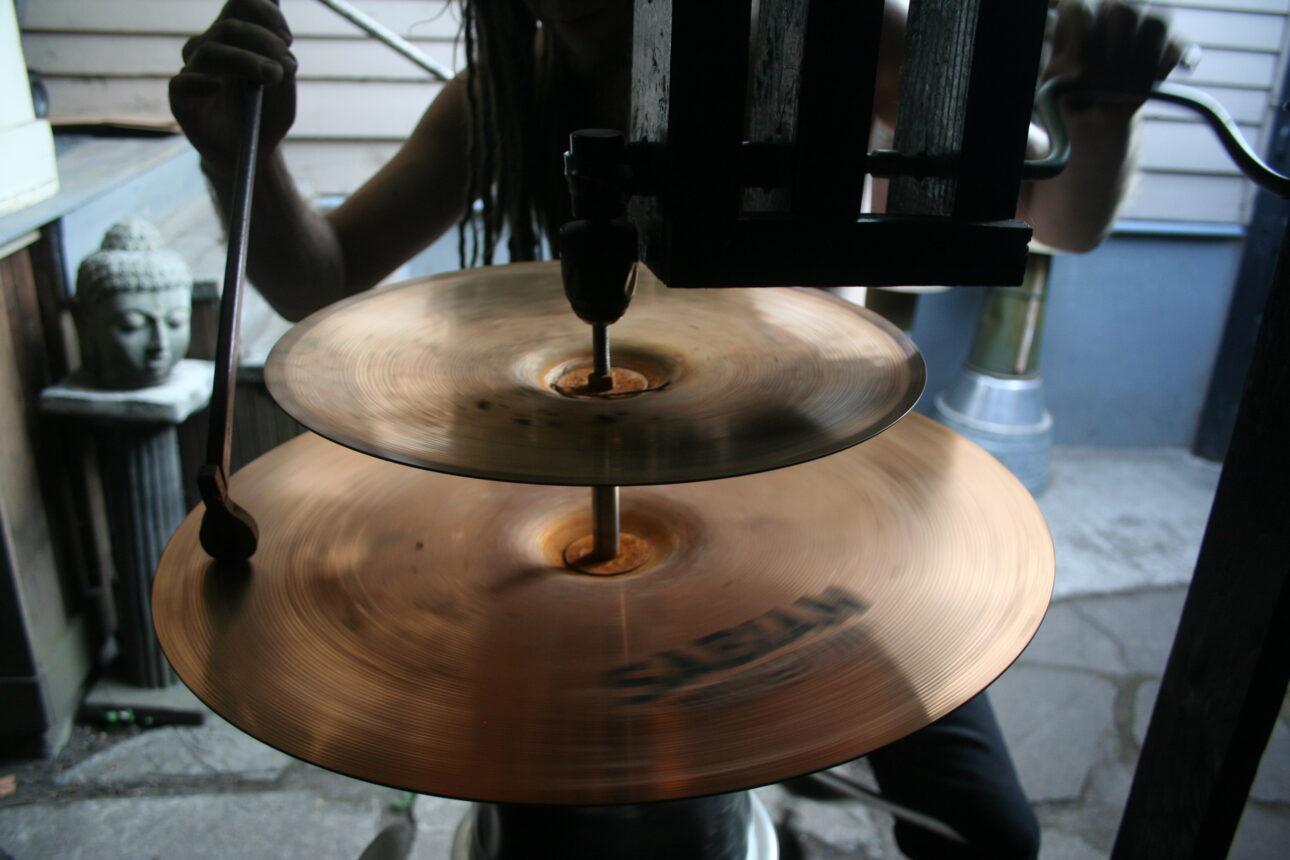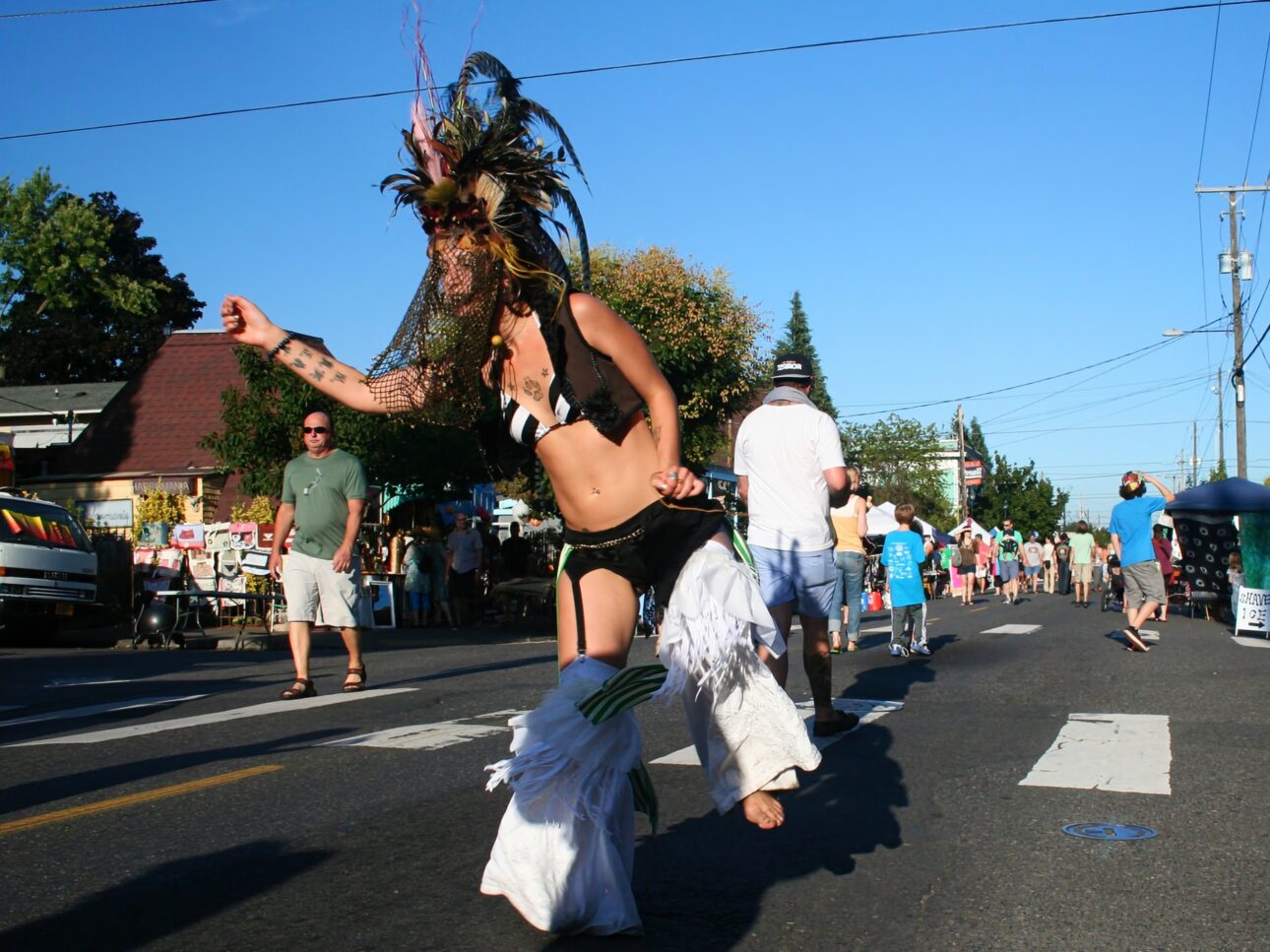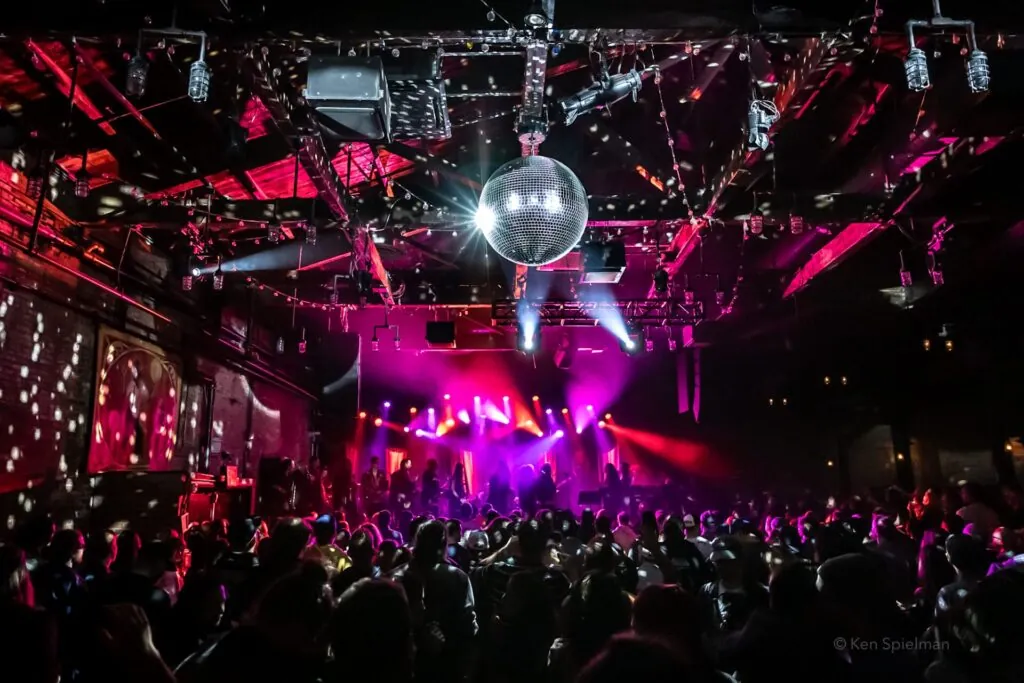THIS IS AMERICA: Once Upon a Time in Portland

The stripper’s flightpath is short and sure. From a profanely deep squat on her transparent stilettos, bouncing harder and harder to White Zombie’s “More Human Than Human”, she power-thrusts up and aloft, fully airborne for an instant, and now slams into a comrade sitting beside me on a high wooden chair. A nude superwoman, the dancer is capeless but mad with power and glee, crashing my friend Vera to the floor of Casa Diablo, Portland’s revered vegan strip joint (“we put meat on the pole, not on the plate”).
Across the void inhabited a split second ago by Vera and her chair sits tonight’s third compadre, James, a depressed graduate student of psychoanalysis experiencing relationship troubles.
Sprawled beneath the aerodynamic blonde voluptuary is a dazed Vera, head smacked and ringing, fingers still clutching dollar bills for the garter-belt feed. Looking surprised by her own impulsivity, the wingless bird of paradise giggle-fusses over our felled friend until a bouncer muscles in to disentangle them.
“What happened?” the bouncer asks.
“She flew,” says James, eyebrow arched. “Unheard of.”
Smoking a Native Spirit on the deck to acclimatize to the coke she tooted to clear her head, Vera moves ever so slightly to the thrum and warp of Monster Magnet’s “Space Lord,” surveys the women experiencing clothelessness, the club’s idiosyncratic and notably co-ed mix of voyeurs, and exhales. “Matt,” she says. “I feel happy; a weird sensation to which I am not accustomed.”
The dancer who’d body-slammed her to satori swooshes up in a sheer negligee to tell us she is trashed from this evening’s monthly Pearl District art fair where she models jewelry and champagne. Casa Diablo, says the dancer, has now restricted her to one drink an hour until they can be sure she’ll behave. Concerned, Vera takes her arm and asks if she is okay. They reassure each other that they’re each fine, but the dancer says she still wants to make amends and leads Vera away for a complimentary, compensatory, but, of course, not compulsory lap dance, the stirring sight of which prompts James – whose nostrils are also dusted with the substance Freud praised for untying the tongue – to muse upon the wisdom of the master. Stroking his nose as Vera swoons and di beneath roving smotherings of bliss, James points out that “Freud did write in a footnote to Civilization and its Discontents that “man has an unmistakably bisexual disposition.”
Picking over plates of Casa Diablo’s vegan enchiladas, the conversation turns from whether it is NE Alberta with the city’s most ethical Japanese-Colombian fusion food, to whether Portland in general might be stuck at what Freud dubbed the oral stage of development: in an overweening obsession with ingestion.
Sated, despite neither eating much nor having been consumed by one of Diablo’s seraphim, James declares that, like Vera, the night has been effective in lightening his mood and thus he can now return home as a more salubrious and satisfying partner to his increasingly depression-intolerant beloved.
We three talk of meeting again for more hurly-burly, and then go our separate ways.

A few days later
Levi, a dreadlocked refugee from a Jehovah’s Witness community in Weezer, ID, says to head on through his house to the Vessel, a Portland speakeasy of uncertain hours and questionable clientele. I’ve heard stories, including from Heather a queer cam girl and El Mundo an ambivalent barber, but no one described this dark-hewn nineteenth Century dream of a secluded suburban hut.
A ship’s wheel is fixed at the end of the serving bench, beside a pump organ ornately carved with cursive script and flourishes. The mounted skull of a large horned beast has pre-eminence, a pentagram fixed above its eye sockets. Wheeled sculptures crafted with cymbals, inverted ash cans, and foot pedals stand by the entrances.
“This is great,” I say, spinning the ship wheel. “I’d love to come back when this place is happening.”
“It is happening,” says Levi. “You’re here.”
I’ve heard nights at this underground establishment can get full to overflowing, so I ask if the Vessel ever cops heat from Portland authorities.
“They’re not in the same world as us,” says Levi, pulling out a bowl of brown waxy lumps to illustrate his point. This opium, he says, is locally grown, not felched from the anus of the “whole violent profit-machine chain” that leads into Afghanistan or Mexico. “In Portland we’re constructing our own situation,” Levi says.
He fills a pipe, and El Mundo appears. After a time each of the duo embrace one of the sculptures, picking up sticks with piano hammers attached to the ends. They press the foot pedals, setting into rotation the cymbals and other percussive pieces. Levi establishes a drone, while eventually El Mundo starts a waterfall of metal running through the summer sun. A third man—with leonine hair—appears and assumes a position at a third instrument, adding a searing wail to the mesmeric wash.
It’s maybe half an hour before the sound is released and fades away.
“Now you’ve heard Noiseum,” says Levi.
When I ask if they play festivals, he shows me how the instruments tip for attachment to bicycles, their base wheels made for towing. Anywhere they want to ride to play, anytime, is a festival, don’t I know?
“I’d love to see you play,” I say.
“You just did.”

A few days later
The Variant Laboratory is another unlicensed, not-in-the-same-world-as-us venue, but on the scale of a substantial nightclub. Inhabiting a disused commercial building a few blocks from NE Alberta, it is this evening the venue for countercultural Portland’s feral night of nights, its mobscene gala, its X-rated live-action audience-participation game-show extravaganza, Booth or Dare.
Out front, neo-tribal warrior themed women clad more in ink than fabric posture and glare, while in glides a man high on a double decker bicycle. He loops in slower circles, talking to the Amazons until the contraption nearly halts and he hops deftly down.
Heather, an unpretentious and ever cheerful spirit from Florida who says that she and her roommates make rent by porn-camming in a stable managed by her landlord, is running the bar inside.
Levi is here, too – more than here; he’s the vamp-flanked M.C., a dreadlocked Cat in the Hat padding about, quipping riddles about the shenanigans to come. A youth in a top hat directs all comers to write their name on one piece of paper to be tossed in a tabletop hat, and a suggested dare to be tossed in another. “Most dares involve getting naked,” says the lad.
Off to one side of the main room stands a rectangular platform hosting a grubby mattress enshrouded by a set of semi-opaque curtains hanging around the sides and sealing it off but for access slits.
Levi and his vixens take to the stage, call to the assembled to momentarily hush the widespread chatter of spiritual accomplishments and anarchist activism and to ready themselves for the contest. With due pomp the saucy trio unveil a spinning game-show wheel divided between fates of Booth, Dare, and Cream. Should the arrow point to Cream, the contestant must bare her or his torso for the vamps to spray canloads of whipped goodness all over. “Should the milk-averse land their own spin on Cream,” proclaims Levi, “they naturally have the option of proceeding directly to the booth.”
Each vamp holds one of the hats to have been stuffed with either names or dares. As I watch the first contestant, a wiggly young woman, spin the wheel, decline the booth and instead work through her designated dare of performing a naked handstand to tumultuous applause, there’s a tap on my shoulder. It’s Vera. She is still standing after joining Portland’s participation in World Urban Golf Day, in which players in fancy dress drink their way around the city, whacking a tennis ball into a series of designated gaps or holes as they do so. The end-of-drinks drinks were at Casa Diablo.
Vera, a retired gymnast, rates the dared woman’s handstand as quite decent, and then hearself is called and heartily creamed by the revolutionary fetish carnies.
A well groomed and toned young man with an unusually long penis performs star jumps unzipped, then leaves himself hanging free during conversation with a bevy of admirers.
A pungent vagabond jumps at the chance to enter the groping booth, stripped to his stain. Soon he can be heard calling for someone, anyone, to reach in and touch his wiry stick of a dick.
From there, matters get intense.

Earlier that day
At a recent lunch of the Oregon Native American Chamber, an indigenous studies professor from Portland State University, Cornel Pewewardy, said he was short for time but if I wanted to talk then I could catch him this morning at a pow wow.
I spot Pewewardy across the yard of a Native school up near PDX International, on NE Columbia Blvd, but he says to wait. He is helping officiate, but there’ll be time when things settle down. “I’ll come and find you,” he says.
I am sitting, waiting, in the bleachers, when the drumming begins. As the BOOM-boom BOOM-boom BOOM-boom BOOM-boom BOOM-boom takes hold the yard fills with more and more Indians of all ages, in beads and bones and denim and wings, who crouch and twist and shudder. I’ve been told time and again by white thrill-riding Portland, feral hipster trickster Portland, that it’s sad about the Indians but that they’re long gone and now it’s up to people like “us” to embody in a contemporary, right-on way the lost consciousness of tribe. Not that they’re here. Am I here? I don’t know. Maybe not first the first hour of the drumming, nor even the second, but by the third and most definitely by the fourth I am a raw mess weeping at the back of the bleachers.
“Okay,” says Cornel, sitting down beside me. “I have a few minutes.”
We talk for longer than that. Most pertinent to this is perhaps what he says about the Portland-as-playground people’s misconception—about my ignorance—of tribe and ritual, whether Anglo-transient or Native. I was recently taken to a sweat lodge outside the city, an experience which left me feeling impostery, so I ask what that ceremony was meant to be about.
“Sacrifice,” he says. “It’s supposed to put you in a state of mind where you say, ‘What can I do to sacrifice for the benefit of my people?’ It’s not supposed to be about individual growth or being comfortable or having a cool time. It should hurt,” Cornell says. “It’s not torture but suffering to the point where you want to give back, where you want to walk the Red Road for others, for your tribe. You don’t want the Red Road for yourself.”
The professor says that too many people of all kinds have false consciousness, have America, between them and their wounds, and so they can’t see how things and what needs to be done. “People don’t even know who they are,” he says. “Not even the white kids, the settler kids. Look at what’s important to them here in Portland – they want to fly kites and hike the mountain.”
Link to the source article – https://www.spin.com/2023/11/this-is-america-once-upon-a-time-in-portland/
Recommended for you
-
Ernie Ball Guitar String Winder (P09611)
$9,99 Buy From Amazon -
INKNOTE 16 PCS Tuning Pin widely for Lyre Harp,Zithers,Harpsichord,Dulcimer,and other Primitive Stringed Instruments, with L-shape Tuning Wrench Gooseneck Tuning Hammer Lever and dust-free cloth
$9,99 Buy From Amazon -
Fender Fullerton Strat Concert Ukulele, Black
$0,00 Buy From Amazon -
RAP Forever – Large Unique WAVe/Kontakt samples/loops studio Library
$14,99 Buy From Amazon -
ADJ Products, MYDMX RM, DMX Light Show Storage Device Saves up to 16 Preset Shows D367
$299,17 Buy From Amazon -
RÃDE RÃDECaster Pro II All-in-One Production Solution for Podcasting, Streaming, Music Production and Content Creation,Black
$699,00 Buy From Amazon -
Cable Matters 2-Pack Premium XLR to XLR Cables, XLR Microphone Cable 6 Feet, Oxygen-Free Copper (OFC) XLR Male to Female Cord, Mic Cord, XLR Speaker Cables, Black
$23,99 Buy From Amazon -
Alfred’s Basic Piano Library Lesson Book, Bk 1B (Alfred’s Basic Piano Library, Bk 1B)
$8,70 Buy From Amazon













Responses